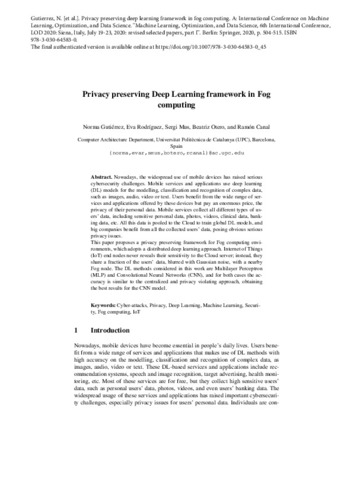Mostra el registre d'ítem simple
Privacy preserving deep learning framework in fog computing
| dc.contributor.author | Gutiérrez Escobar, Norma |
| dc.contributor.author | Rodríguez Luna, Eva |
| dc.contributor.author | Mus León, Sergi |
| dc.contributor.author | Otero Calviño, Beatriz |
| dc.contributor.author | Canal Corretger, Ramon |
| dc.contributor.other | Universitat Politècnica de Catalunya. Departament d'Arquitectura de Computadors |
| dc.contributor.other | Barcelona Supercomputing Center |
| dc.date.accessioned | 2021-01-14T11:23:58Z |
| dc.date.available | 2021-01-14T11:23:58Z |
| dc.date.issued | 2020 |
| dc.identifier.citation | Gutiérrez, N. [et al.]. Privacy preserving deep learning framework in fog computing. A: International Conference on Machine Learning, Optimization, and Data Science. "Machine Learning, Optimization, and Data Science, 6th International Conference, LOD 2020: Siena, Italy, July 19-23, 2020: revised selected papers, part I". Berlín: Springer, 2020, p. 504-515. ISBN 978-3-030-64583-0. DOI 10.1007/978-3-030-64583-0_45. |
| dc.identifier.isbn | 978-3-030-64583-0 |
| dc.identifier.uri | http://hdl.handle.net/2117/335322 |
| dc.description.abstract | Nowadays, the widespread use of mobile devices has raised serious cybersecurity challenges. Mobile services and applications use deep learning (DL) models for the modelling, classification and recognition of complex data, such as images, audio, video or text. Users benefit from the wide range of ser-vices and applications offered by these devices but pay an enormous price, the privacy of their personal data. Mobile services collect all different types of us-ers’ data, including sensitive personal data, photos, videos, clinical data, bank-ing data, etc. All this data is pooled to the Cloud to train global DL models, and big companies benefit from all the collected users’ data, posing obvious serious privacy issues. This paper proposes a privacy preserving framework for Fog computing envi-ronments, which adopts a distributed deep learning approach. Internet of Things (IoT) end nodes never reveals their sensitivity to the Cloud server; instead, they share a fraction of the users’ data, blurred with Gaussian noise, with a nearby Fog node. The DL methods considered in this work are Multilayer Perceptron (MLP) and Convolutional Neural Networks (CNN), and for both cases the ac-curacy is similar to the centralized and privacy violating approach, obtaining the best results for the CNN model. |
| dc.description.sponsorship | This work is partially supported by Generalitat de Catalunya under the SGR program (2017-SGR-962) and the RIS3CAT DRAC project (001-P-001723). |
| dc.format.extent | 12 p. |
| dc.language.iso | eng |
| dc.publisher | Springer |
| dc.subject | Àrees temàtiques de la UPC::Informàtica::Intel·ligència artificial::Aprenentatge automàtic |
| dc.subject | Àrees temàtiques de la UPC::Informàtica::Seguretat informàtica |
| dc.subject.lcsh | Machine learning |
| dc.subject.lcsh | Privacy, Right of |
| dc.subject.other | Cyber-attacks |
| dc.subject.other | Privacy |
| dc.subject.other | Deep learning |
| dc.subject.other | Security |
| dc.subject.other | Fog computing |
| dc.subject.other | IoT |
| dc.title | Privacy preserving deep learning framework in fog computing |
| dc.type | Conference report |
| dc.subject.lemac | Aprenentatge automàtic |
| dc.subject.lemac | Dret a la intimitat |
| dc.contributor.group | Universitat Politècnica de Catalunya. VIRTUOS - Virtualisation and Operating Systems |
| dc.identifier.doi | 10.1007/978-3-030-64583-0_45 |
| dc.description.peerreviewed | Peer Reviewed |
| dc.relation.publisherversion | https://link.springer.com/chapter/10.1007/978-3-030-64583-0_45 |
| dc.rights.access | Open Access |
| local.identifier.drac | 30243068 |
| dc.description.version | Postprint (author's final draft) |
| local.citation.author | Gutiérrez, N.; Rodríguez, E.; Mus, S.; Otero, B.; Canal, R. |
| local.citation.contributor | International Conference on Machine Learning, Optimization, and Data Science |
| local.citation.pubplace | Berlín |
| local.citation.publicationName | Machine Learning, Optimization, and Data Science, 6th International Conference, LOD 2020: Siena, Italy, July 19-23, 2020: revised selected papers, part I |
| local.citation.startingPage | 504 |
| local.citation.endingPage | 515 |


